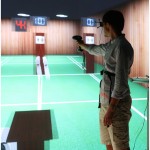 Brain-Computer Interfaces for the analysis and training of athletes’ performance
Brain-Computer Interfaces for the analysis and training of athletes’ performance
The promotion of sport is a major challenge of our societies. Sport is a powerful tool not only to mitigate derived health problems due to inactivity and alimentary disorders, but also to provide cohesion to our societies. This joint project tackles one of the main tools for sport promotion: training. While training is essential to improve performance of top-level athletes, it is also a great source of motivation for the general public, provided that the improvement of skills is effective.
The long-term objective behind this project aims to the creation of a new generation of sports training tools that include the mental state of the athlete in the training procedures. Current training is only based on the physiological and biomechanical abilities of athletes. However, sport performance is not only the ability to perform the best movement during training and to be in the best physical condition. Why top-level athletes choke when shooting a decisive penalty kick or when fighting for a decisive tie-break? Sport performance is multifactorial as it is regulated by a set of biomechanical, neurophysiological, psychological, sociological and cognitive processes, working concurrently and continuously. It indeed also implies focusing on the task, anticipating the action of the opponent, controlling the pressure and the competition anxiety. The mental state of the athlete is thus a key component, which is fundamental for increasing sport performance.
The major research challenge consists here in identifying the relationship between the biomechanics of the motion and neurophysiological information. When training any kind of sports ability, experts as well as novices adapt their next actions based on the associated positive or negative reinforcement values, obtained through subsequent feedback of their performance. Current training systems can at best control the training situation and make the link between the information perceived and the athlete’s motor performance. At present, however, these training systems do not take into account the actual unfolding of mental states that happened in the athlete’s brain during the action.
To do so, the study of such correlates must be performed in controlled experiments using cutting-edge technologies of motion analysis, electroencephalography (EEG) and virtual reality (VR). While VR will immerse athletes in controlled and realistic virtual environments reproducing competitive scenarios, motion analysis and EEG will enable the recording and analysis of brain correlates and athlete’s performance. Furthermore, by studying brain correlates relevant to our training tool in the context of sports, we aim at reproducing some neuroscientific results outside constrained laboratory conditions, and yet obtained in highly controlled settings (to minimize systematic bias) in VR scenarios with high ecological validity.
The project therefore involves different and complementary fields of expertise: motor control and learning in sports (Rennes 2 University, M2S), virtual reality (Inria, Hybrid) and brain-computer interfaces and electrophysiology (EPFL, CNBI).
The results should allow the progressive creation of training tools enabling the decoding and optimization of a selected subset of mental states necessary for sports performance through the use of real-time brain signal analysis, thus leading to faster learning. According to the target of the training tool, various solutions could be envisioned, from offline analysis of brain signals or neurofeedback solutions for the wide public, till high-end virtual reality systems being able to provide adaptable and specific training protocols for federations, sport clubs or training centers.
Team Members
Anatole Lécuyer (DR, Inria, Rennes)
Ferran Argelaguet (CR, Inria, Rennes)
Benoit Bideau (Prof., Univ. Rennes 2)
Richard Kulpa (Prof., Univ. Rennes 2)
José del R. Millán (Prof., EPFL)
